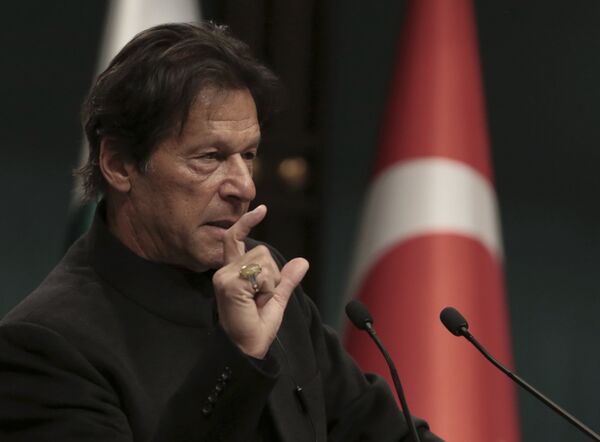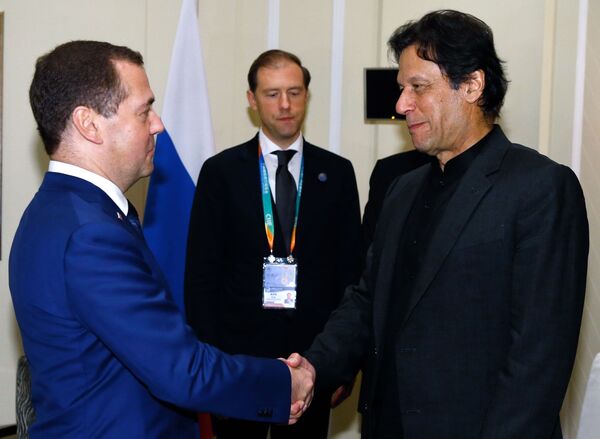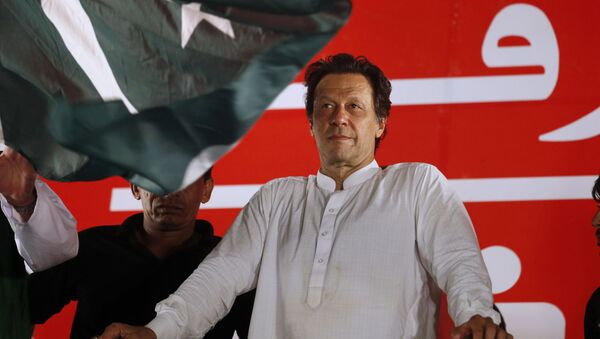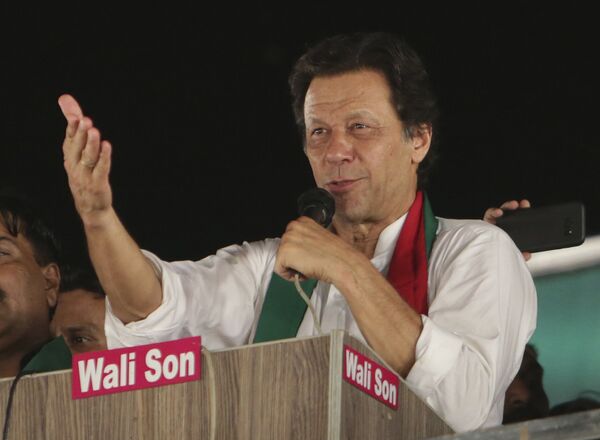Sputnik: Do you plan to have talks with the Russian leadership in the near future? Do you yourself plan any visits to Russia?
Imran Khan: I would love to visit Russia. I have — a long time ago — only been once. And, yes, I hope to meet the Russian leadership in this conference in Bishkek, the SCO meeting this coming week. So I hope to meet President Putin.
Sputnik: What are your expectations from this meeting?
Imran Khan: I think this will just be an informal meeting on the sides of the SCO conference. I already met him briefly during my visit to China, where there was conference by Chinese President Xi. So I met him, but this time I hope to have an informal chat with him. I already met the prime minister of Russia in China on my first visit.
Sputnik: The Russian military has announced recently that Russian troops will hold military exercises with Pakistani forces later this year. How do you assess military cooperation with Russia? Are there any plans to further strengthen cooperation between our armed forces?
Imran Khan: Yes. We have developed cooperation with Russia between our defence forces. There has always been meeting. I think our defence personnel have already met. And so, yes, we hope to deepen our contacts.
Most of the 50s, 60s, 70s were spent in the Cold War region, where India was close to the Soviet Union, and Pakistan was close to the United States. We were in different camps. Now things have changed. India is also friendly with the United States, and Pakistan is also friendly with the US. So we no longer have the Cold War situation. It is refreshing that we have developed our contacts with Russia, and they are developing all the time.
Sputnik: Your country has been long importing US-made weapons, even became of the largest arms buyer, but now Russian arms seem to be getting a lot of attention in the region. Is Islamabad planning to purchase Russian weapons as well? Are you considering the purchase of the S-400 air defence systems?
Imran Khan: As I’ve said, once the Cold War was over. Previously Pakistan was tied to the US, and, as we all know, India was tied to the Soviet Union. And no longer is that situation there. First, we hope that our tension with India decreases, so we do not have to buy arms because we want to spend money on human development. But, yes, we are looking for arms from Russia, and I know our military is already in touch with the Russian military.
Sputnik: Has there been any progress on the Iran-Pakistan pipeline project? Are you planning to completely suspend the project due to the US sanctions?
Imran Khan: You see, at the moment there has not been much progress, and that is because of the sanctions put on Iran by the United States.
Sputnik: How do you assess the prospects for Pakistan’s cooperation with Russia within the Shanghai Cooperation Organisation?
Imran Khan: We have exchanges, we develop more contacts, we improve our trade. Russia is an energy-surplus country. Pakistan has shortages in energy, so we hope to talk on those areas. We already are. Apart from defence, we want to also improve our trade in other areas with Russia.
Sputnik: Which areas do you mean?
Imran Khan: Well, this is what we are exploring. We hope our trade delegations will soon go to Russia. We will invite Russian trade delegations here, get them opportunities to invest in Pakistan. I do believe that there is a Russian steel company, which is looking to invest in our steel mill in Karachi. In fact, it was made by Russia. The steel mill of Pakistan was made by the Russians a long time ago, I think in the 70s.

So we hope that we will start expanding areas of cooperation, and we will explore areas of strength, where we would love them [Russia] to come and invest in Pakistan. We are opening up investment opportunities in Pakistan. We are opening up visa regimes in Pakistan so that people do not have to go through the long complex process of getting a visa, they can actually come and get a visa at the airport.
Sputnik: Is it possible that Russia and Pakistan will get no visa regime?
Imran Khan: Well, Pakistan is going in this direction. Seventy countries will now be able to get visa at the airport. Previously we did not have this agreement with anyone, but now we are opening up Pakistan for tourism, for investment, and we feel that we want to make it easier for countries to come and get a visa. There are seventy countries — and Russia is included in those countries who can come, the Russian can come and get a visa at the airport.
Sputnik: Getting back to the Shanghai Cooperation Organisation, do you find your participation in the organisation helpful for improving relations with India?
Imran Khan: Actually, the SCO is improving relationship with all the countries in the SCO areas. Previously, Pakistan’s orientation was more towards the West. Now Pakistan is looking to diversify, find new markets or different relationships with those countries, which we had very nominal relationships [with] before.
The SCO countries provide us [with] these fresh outlets and developing our relationship with these countries. And that means, of course, India as well because at the moment our bilateral relationship with India is, probably, at its lowest point. And, yes, it will be an opportunity to speak to the Indian leadership during this SCO conference.
Sputnik: Does Islamabad seek any international mediation in reconciliation with India? Can Russia, for example, become such intermediaries?
Imran Khan: Pakistan is looking for any kind of mediation, because Pakistan believes that progress comes with peace. And when you have tensions with your neighbours, it detracts from resources that could be spent on human beings. They end up getting spent on unproductive things like arms. And so we believe in peace with all the neighbours, especially with India. We’ve had three small wars with India, and they damaged both the countries. Because in the Indian subcontinent we probably have the greatest amount of poverty in the world.
It is my belief that the money should be spent on getting people out of poverty, like China got millions and millions of people out of poverty. And so our emphasis should be peace, resolving our differences through dialogue. And our main difference with India is Kashmir. And if the heads of two countries resolve, if two governments decide, this issue can be resolved. But, unfortunately, we have not had much success from India so far. But we hope now that the current prime minister has one big mandate, we hope that he will use this mandate to develop better relationship and bring peace in the subcontinent.
Sputnik: What efforts does Islamabad plan to take to ensure lasting peace with India? Are you personally willing to sit at the negotiating table with Modi after his reelection?
Imran Khan: Well, we have already indicated to India that after the elections… We actually tried before the elections, but unfortunately we felt that before the elections Prime Minister Modi’s party was building up this hysteria, unfortunately, anti-Pakistan feeling among its people, appealing to its right-wing Hindu nationalists, and so there was no chance of peace before the elections.
Now that the elections are over we hope that the Indian leadership will now grasp this opportunity, avail this opportunity that Pakistan is offering — that let’s resolve all our differences through dialogue. In fact, that is the only way of resolving our differences. There is no way two nuclear-armed countries should think of resolving the differences through military means. It is madness. So we hope that now we can progress, use dialogue to resolve our differences.
Sputnik: Do you plan to boost people-to-people contacts between Pakistan and India through initiatives similar to the Kartarpur corridor?
Imran Khan: The Kartarpur corridor for the Sikh community has been a great initiative from Pakistan. And we hope that, as I’ve said, now that the elections are over, India will respond positively to these initiatives, to further people-to-people contact. But, unfortunately, people-to-people contact only works when the governments also try to get closer. You can’t have a situation where the governments have animosity towards each other, and expect people to get closer. It does not happen.
So the governments have to, the Indian government has to take this initiative. Unfortunately, as I’ve said, they do not do so before the elections. Now, I think, it is time for them to take the initiative, and so we can get back on the dialogue table. And, I repeat, the only difference, if we resolve that there will be peace in the subcontinent, that’s Kashmir. Unfortunately, Kashmir can only be resolved if the people of Kashmir are given the right of self-determination, which was guaranteed to them by the United Nations in 1945.
And they would deprive of the right, and this use of force by the Indian government to subdue has backfired. The more force there has been used, the more the people of Kashmir have turned against the Indian government, the more radicalisation has come in the young people of Kashmir. And it is a future source of destabilisation of the continent. That’s why it is very important to resolve the Kashmir issue.
Sputnik: Media have recently reported about the plans to construct a 700-km railroad connecting Uzbekistan, Russia, Afghanistan and Pakistan. Is there any specific timeline for its construction? What do you expect from this project?
Imran Khan: I think this is a tremendous project because connectivity between Pakistan going on through Afghanistan to Uzbekistan, to Russia will open up this whole region. And then, remember, from there it will go from Pakistan right down to Gwadar, which is the shortest route to the ocean. So it will open up the whole area. The difference is that we cannot give a timeline, because it depends on the amount of funds — can we generate enough funds for this railway. Secondly, it depends upon peace in Afghanistan. Although I believe that all, even the Taliban and the Afghan government, all feel that this railway is important for the future of Afghanistan. So mainly it is the question of having the funds, but this is a great project for the future of the whole area, the whole region.
Sputnik: Pakistan and Afghanistan are set to hold high-level security talks in Islamabad this week. What do you expect from these talks? What items will be on the agenda?
Imran Khan: I can’t say what items will be on the agenda because it will be between military personnel of both the countries, so they will best know how they can benefit from these talks, but I am not in the position to know exactly what sort of talks they would be.
Sputnik: Afghan President Ashraf Ghani will visit Pakistan later in June. What topics will be on the agenda of your talks with him?
Imran Khan: I’ve had a meeting with President Ghani in Saudi Arabia, just a week or so ago. We had a very good conversation, we talked about how Pakistan help Afghanistan in resolving the issue about the civil war that is going on there, how we can get the Taliban to talk to the Afghan government and how there can be peace in Afghanistan. So it is in the interest of Pakistan and Afghanistan for there to be peace in Afghanistan.
Because after Afghanistan the country that is most wanting there to be peace in Afghanistan is Pakistan because war that happens in Afghanistan affects the border line, border areas of Pakistan as well. Hence it is in the interest of both countries that after these long almost 40 years of military action, civil war, foreign invasion we feel that people of Afghanistan deserve peace. So Pakistan will be trying everything and is trying everything to help there to be peace, so that the Taliban start talking.
They are already talking to the Americans, and we hope that the Taliban will then talk to the Afghan government so that there is peace. And this is something we crave in Pakistan because it will not just be that will mean that Afghanistan will have stability, it will mean that it will open up connectivity between the two countries, trade, the borderline areas, which have been devastated by this war on terror and then before that the civil war, then the US invasion of Afghanistan, before that the Soviets — so the whole area has been devastated. And so the only way is peace and then allow trade and connectivity.
Sputnik: How do you assess the role of Moscow and the Moscow format talks on the Afghan settlement? How can Russia further assist the Afghan settlement?
Imran Khan: Well, Russia has already taken steps. In Moscow, there were these talks held by the Russian government between Taliban and various members of Afghan political parties, so there was this broad-based talks held in Moscow, which is a very positive thing. And I think Moscow has a role to play, Moscow has influence in areas of Afghanistan. In fact, all the neighbours should help to bring about peace and stability in Afghanistan.
Sputnik: What would you like to say to our Russian and international audience?
Imran Khan: Well, to the Russian audience I would say the one thing — that Pakistan and Russia, and before was the Soviet Union, we did not have very good relationship with each other. And then, when [there was] the Afghan jihan, when the Soviets went to Afghanistan, we were in opposing camps. But times have changed now. And I am very happy that we now are moving closer to Russia, we are developing our relationship with them.
And we hope that this relationship will keep improving, and there will be more people-to-people contact — people from Russia will come over to Pakistan. It is one of the most diverse countries in the world. We are opening up Pakistan to tourism. And so we hope people from Russia will come to Pakistan. And, also, I hope to go and visit Russia on an official visit, I look forward to that. I just feel that it is important now that Russia and Pakistan move closer.

There was a time when Russia used to look West for a long time, now Russia has started looking towards East and South. The SCO is a due organisation. And Pakistan for a long time used to look to the United States as the only ally and trading partner, and of course Europe. Pakistan is also now with China becoming an economic giant. Pakistan is also with the CPEC, which is Belt&Road Initiative, one of the main initiatives of BRI is CPEC.
Pakistan has now opened up its vision of rather than being restricted to one or two countries, it’s just opened up. And this is a new world coming up, things are changing in the world. The world is changing. The power centres are changing, or there are different power centres growing. And so we hope that in this new world order our relationship with Russia keeps improving.
Sputnik: What will you tell our international audience?
Imran Khan: Well, to the international audience I would say what I’ve just always believed in — that the world should move towards improving trade, helping the poor people of this world. The world should combine together to end poverty. It should reduce these tensions in the world. All the tensions that are going on in the Middle East, in the Muslim world we have — what should I say — one after another the Muslim world is suffering from some sort of war, some sort of bloodshed. And I’m a pacifist, who believes that military is no way of resolving issues in this world. And Pakistan has suffered a lot in these last 10-15 years after joining the US war on terror. And we’ve suffered a lot.
Our country lost over 70,000 people dead, and billions of dollars are lost to the economy. So my government believes that we want to be a country, which will bring countries together, which will play a part in reconciling differences between countries. But we would never want to be part of any country, which joins any war coalitions. We want to play a part in bringing countries together, and peace, and trade, so that we can have more harmony in this world. So I am an idealist and that is what I believe.


